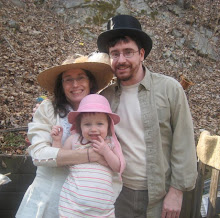This sounds GREAT! I just finished leading a book club about NurtureShock by Po Bronson in which he reviews all this stuff about the ill effects of praise..hm, I should go dig that up.
One striking observation from the book was that kids who were praised (outside the family, presumably all different kinds of family situations) after a test with a measly one sentence saying either "Wow, you're really smart" or "Wow, you worked really hard at that" (that's paraphrased) had pretty dramatically different responses to the next test being harder. Kids praised for being smart were worried about losing that status and didn't want to take a harder test when given a choice, while kids praised for working hard were much more willing to take a chance and then ENJOYED the challenge (while kids praised for being smart showed more signs of stress). Hm, should I use "praised" there, or noticed/labeled? So, "noticing" something our kids do by labelling them as something is not the kind of noticing that helps them grow into their true selves.
Another study showed that kids who were taught that their brains got smarter if they studied (rather than that they're stuck fulfilling whatever label they've been given as smart or dumb) studied a lot harder! It's kindof like the kid Vicki talked about in momTV last night who was thrilled to discover his own study habits and what could empower him to do better in class (in that case, he figured it out himself).
Similarly, later in NurtureShock he talks about the strength of a technique that involves giving preschoolers a chance to pick out which letter that they've written is the best. This uses the "ask a question" style of encouragement, and it does strengthen a kid's opinion of herself to assess herself. Bronson talks about how it helps kids build up their own internal image of what they're trying to do, which makes it a lot easier to try to reach that goal.
I also liked how the history discussed pointed out a seminal paper that showed the power of having good self-esteem. This seemed to have created a cultural appreciation of good self-esteem. However, it almost seems like we all assumed that since insults feel so damaging to our self-esteem, praise is the antidote. While in contrast, more recent observations (though I dont know how old the stuff is that Vicki is drawing from) shows that that's really not the case. Another thing that would make praise an easy direction to be drawn towards is that praise is pretty easy to do, it's not that much work really (though if it doesn't work, that's not a winning argument!).
Okay, two more cool things then I gotta go to work: Praise makes kids more likely to eye-check with adults/authority figures when doing something or saying something; and it makes them more likely to word their answers to questions like questions. So, you can SEE the effects of it in these body-language signs of insecurity.
Have two simple stories about relationship I want to toss in later, hopefully soon.
How Does Less is More Parenting Differ from Permissive Parenting?
-
When parents hear me advocate for using duct tape to control their words
and actions as parents, they naturally ask me: What’s the difference
between a L...
7 years ago

No comments:
Post a Comment